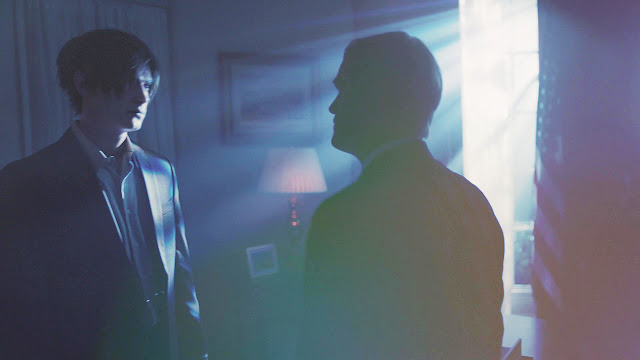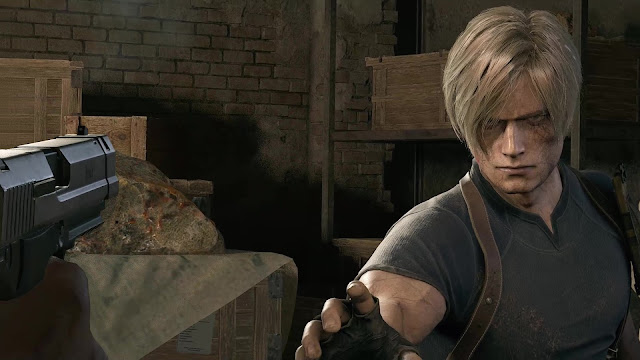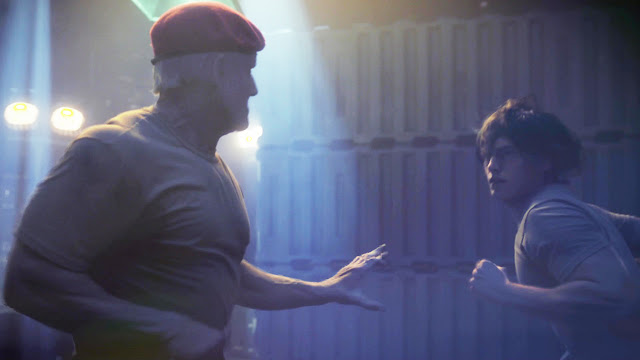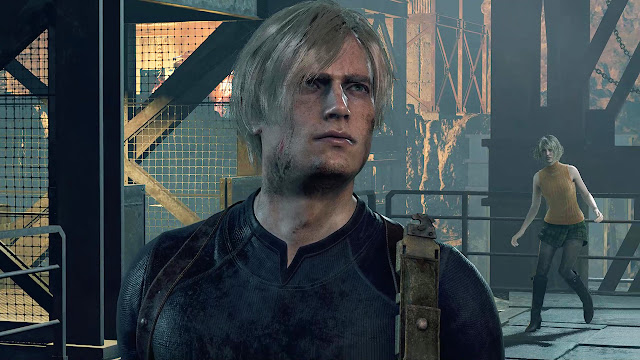It's been eighteen years since the release of the classic Resident Evil 4, one of the most iconic games of the Resident Evil saga, and its recent remake marks a big change in the way that its story plays out and how it evolves along with its emblematic, unforgettable characters. With its remake, Resident Evil 4 is no more the fairytale-like story of a brave agent on a mission to rescue a damsel in distress. It is a dark and gloomy tale where the characters carry the weight of their pasts and the burden of their environments, and their actions and decisions are direct corollaries of both these factors. Similarly, Leon S. Kennedy, its equally iconic lead character, has become more cynical, more sarcastic and distant, and far less keen on trusting people, as a reasonable result of all that he had gone through. It is not that all these elements did not exist in the original game, it is simply that the view of the classic Resident Evil 4 was much different, in that it focused more on the adventure and action factor and much less on the characters themselves. Now everything has equal presence in the game; there is adventure, there is heavy action, but there is also room now for a good deal of character development.
Resident Evil 4 has grown with its audience reaching its own allegorical coming of age, by toning down its playfulness for the sake of a much more serious and compelling version of its story. The gloomy atmosphere is not only due to the fact that both Leon and Ashley are seriously infected and time is not on their side; this was also part of the original plot anyway, although now the symptoms that they are experiencing are far more chilling and scary. With how the game and its characters have "grown", and coming from the remade story of Resident Evil 2, Leon's backstory can now be seen under a new light. Leon carries a heavy trauma from his Raccoon City experience, further intensified by the prestigious but not so desired position that he was blackmailed into accepting as a government agent, following his return. While in the original Leon seems to have accepted all this and looks quite confident and cool, Leon of the remake is far more realistic in his reactions and even from his narration in the intro it becomes more than obvious that he has neither forgotten nor forgiven anything or anyone. Directly opposed to this is his innate tendency to help and protect people, which was his main motive for wanting to become a police officer back in the day.
Directly related to this is the theme of voluntary and involuntary sacrifice that slowly becomes prominent as the story progresses. At the end of the game, Ada has a conversation with Wesker during which he blatantly expresses his ambition to cause the death of millions of people so that only one - meaning himself - will survive like some kind of God. This however is not the only time that such a theme is mentioned or hinted at. Much earlier, while on the boat with Ada, Leon has a moral doubt about the value of doing everything you can to save someone when, in the course of this, many other people have to die. This doubt is not random and it is connected to him being in a stressful situation, having to save someone who comes from the exact environment that originally forced him to take on a position he didn't want. In his struggle to save Ashley, Leon put himself in extreme danger by getting infected; he nearly died. He had to save himself primarily because he had to survive so as to save Ashley, as the survival for his own sake would always come second. In the process, Luis was killed; even Krauser was a victim although he only realized it when it was too late. Which is why this doubt comes for Leon after two incidents of major importance, connected to the two men: Luis's murder and the unexpected encounter with Krauser. Leon's former mentor had been in a situation similar to his in the past, when most of his soldiers were perished during an ill-fated mission. So in his turn, Krauser comes from this traumatic past, having witnessed an involuntary sacrifice that drove him insane and turned him into a cynical, sadistic maniac. Luis, on the other hand, sort of signed his fate when he initially worked for Los Illuminados, and his change of heart was not enough to save him, because the forces he had to go against were bigger and much more sly than he expected. Regardless, they had both been victims, each one of them carrying a different degree of responsibility, but this didn't matter much after the point in which they both were unable to escape their destiny.
So seen under this light, Wesker's ambition and Ashley's rescue have more things in common than one would think, although of course Ashley is completely innocent while Wesker is consciously and clearly aiming at eliminating whomever he thinks should die. These two parts of the plot are in fact two extremes that marginally come to a dangerous close when the circle of the story is complete. Which is why Leon, while genuinely wanting to save Ashley because he is a professional above all, never actually bonds with her, because she has the "curse" of being the bearer and reminder of such a heavy negative load. It would not have been the same with Luis, or even Ada. Luis and Ada may have been associated with dark forces, but they were independent individuals, conscious of their actions and decisions, for which Leon could face them straight and directly; which in fact he did in both cases. But he keeps his distance with Ashley because, unbeknownst to her, she is part of the wider environment that eventually brought him to a situation where essentially his life did not matter. And although he always has in mind that Ashley belonging to said environment and her innocence in all this are two different things that he never confuses, for the exact same reason, because his mindset is constantly clear and fair, he can never pretend that the first undeniable fact is non-existent. Although he of course cannot demand accountability of Ashley, as she is not the one to blame for anything, her being part of the system that controls him is a given, and one that cannot simply get brushed off.
From this perspective, the mind control that Saddler has on his victims is not much different from the control that Leon's superiors have over his life. From the safety of her office, Hunnigan keeps ordering Leon to not let anything happen to Ashley, and her worry about his own well-being is strictly connected to how effective he can be in rescuing the President's daughter. Leon is well aware of all that, but this doesn't mean that he accepts everything without having his own moral dilemmas. On several instances throughout the story, he mentions how he cannot forget things that scarred him in the past. And this is something that Ashley would never be able to fully comprehend, in spite of her obvious kind heart and good will, because she is coming from a world that is so different from Leon's. This becomes even more evident in the final scene, where Ashley, in a rather awkward flirting attempt, asks Leon if he is interested to become her personal bodyguard, essentially demanding exclusivity, something that sounds completely opposed to Leon's sense of serving the common good and society as a whole, which is why he diplomatically rejects her offer. In the remake of Resident Evil 2, in the scene where he and Ada come across Kendo and his infected daughter, Leon tells Ada that the reason why he joined the force was to help everyday people like the gunshop owner. Leon was never interested in offering his services to the elite; when he accepted to work for the government, it was a result of that infamous blackmail. Doing this, was a considerable personal sacrifice from his part, given moreover how cruel the subsequent training had been; in his own words, the punishing missions he had to go through nearly killed him.
The big twist of the remake's plot that has Krauser killing Luis instead
of Saddler is the highest point of the revamped story, and where the real
focus actually goes, backed up more by another big twist that has Luis saving Leon's life from Krauser instead of Ada. Krauser and Luis turn out to be an integral part of Leon's life,
personality and evolution, and in the climax where all three of them are present, it feels as if the mission
to find and save the President's daughter was simply the triggering
event that brought Leon face to face with a dark period of his past,
that which involved Major Krauser, while at the same time bringing him
together with someone who was, indirectly, involved in the Raccoon City
nightmare and who now becomes his guardian angel and the only one able
to save him, and that is Luis Serra. This twist that expands the roles of Luis and Krauser brings the story closer to Leon and establishes him as the real and essential driving force of the plot. In its turn, the sub-plot that involves Luis and Krauser has way greater dynamic than
the main story. It can be seen as a separate "arc" within the leading
plot, and it fills the null space between the three characters (Leon,
Luis and Jack) who are inter-connected in more than one ways: Krauser
used to be Leon's mentor and is now on the hunt of the Amber sample
which was developed by Luis. Luis used to work for Umbrella which was
responsible for the Raccoon City incident which led to the series of
events that led Leon to become a government agent, subsequently meeting
Jack Krauser.
Krauser's evolution as a character is also very interesting, as now his story is much more related to Leon and his past. While in the original games he was a mercenary, randomly picked thanks to his abilities to accompany Leon in his mission in South America, in the remake he used to be a Major, Leon's trainer in the elite military group that he was forced to join after surviving the Raccoon City incident. As we can tell from the brief scene in the prologue, Major Krauser had been a particularly tough and relentless trainer, showing traits of a sadistic character that eventually burst to the surface after the incident that caused the death of his men in South America. As it turned out, he and Leon were the sole survivors, but while Leon managed to put all this behind him, at least to the degree where it would not affect his subsequent life, for Krauser it was something that proved impossible to get over.
Because Leon continued to work for the government after this, Krauser interpreted his reaction as treason, without taking into account the fact that Leon was under constant threat and blackmail and there was little that he could do to get out of a situation that might have seemed glamorous and desirable by many, but in fact was extremely stressing. When the opportunity arrived with Saddler tasking him with kidnapping Ashley, Krauser found his golden chance to take his revenge in the most effective way: the President's daughter might have been an innocent civilian, but she was still part of the system that let his men die in the jungle, so harming her would cause a direct blow to those people who were responsible for the tragedy he had lived. It is notable that Krauser's state in the remake is pretty similar to Chris Redfield's after the dramatic events in Edonia in Resident Evil 6, although Chris managed to maintain his sanity, and the post-traumatic syndrome caused him "only" a short-term amnesia and emotional resignation, while in Krauser's case the aftereffects were much more severe and irreversible.
It is hinted in the game that, because of the long hours of private training, Leon and Krauser had developed a special bond, and Leon respected his mentor in spite of his relentlessness. That bond of mentor-mentee or teacher-student was apparently strengthened more during the mission in South America, only to be abruptly broken after the mission's tragic conclusion. This was one more heavy emotional burden that Leon would carry from that point in his life and on, one that was very hard - if possible at all - to put to bed. On first look, this new connection between Leon and Krauser might feel like it somehow weakens their original dynamic, as in the classic game they were equals and Krauser openly and clearly respected Leon as a rival while in the remake Krauser had been Leon's superior and he still insists on treating him as a "rookie" although he is not one anymore. This change, however, leaves room for slowly building an emotional climax between them during their encounters, culminating in the dramatic denouement where Krauser comes to his senses, realizes that he had not been himself all this time and finally calls Leon by his name instead of "rookie", revealing that in fact he did respect him and accept him as a worthy rival, but the arrogance resulting from his infection's superior power did not let him show it before.
The teacher-student dynamic is not limited only to Leon's relationship with Krauser. While accompanying Leon in an important part of his journey, Luis saw himself as a modern Don Quixote, having been a fan of the eponymous literary hero since he was a little boy, and would call Leon "Sancho", who was Don Quixote's faithful attendant. This dipole did not yet represent a teacher-student relationship, but a a bit later Luis differentiated his peculiar "roleplay" by giving Leon the role of a squire - a nobleman who attends to a knight before reaching an equal status himself. It is interesting how both Krauser and Luis saw Leon as their apprentice, while in reality Leon was almost as intelligent as Luis (according to Ada's notes in the original game, he is a genious), and nearly as strong as Krauser himself. Quite ironic as well, since Leon managed to survive them both.
Contrary to the roles of Krauser and Luis that have been expanded and developed, Ada's role is now very limited, but this should not be viewed as a downgrade. As I had mentioned in past articles, Ada's mysterious figure had almost always been omnipresent in Leon's adventures although in practice she never really helped to push the stories forward. There had also been a considerably important oversight concerning her persona, the fact that someone who was supposed to be a spy made her presence so loudly obvious in critical situations. Now all this seems to have been fixed, as Ada moves mostly in the shadows, watching the events from a distance, and she appears as a force of balance, almost a motherly one, at times reassuring even, in spite of Leon's justified cynicism and aggressiveness towards her.
















No comments:
Post a Comment